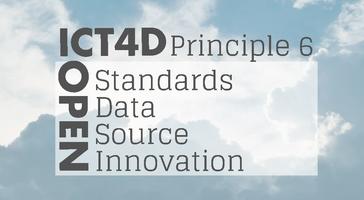A Look Back at Principles for Digital Development

Last month, our team, along with our friends at Futures Group, hosted the sixth Principles for Digital Development meeting on open standards, open data, open source, and open innovation. For those that haven’t attended a working group meeting in the past, these sessions provide an opportunity for members of the development community to share lessons learned and best practices in the implementation of ICT4D projects.
In advance of the Principle 7 meeting in San Francisco next week (it’ll be streamed for those that are interested in attending remotely), I thought a short recap of where we left off would be a good primer for this month’s discussion on reusing and improving existing tools, platforms, and frameworks.
Here were some key takeaways from the Principle 6 discussion:
- Open standards allow organizations to better coordinate activities and prevent silos within networks. Standards in digital development are like a blueprint that provides developers with guidance on how to build software. Two underlying principles of open standards are uniform terminology and interoperability of how information is exchanged by information systems. These specifications are intended to ensure that products made by different people will either work well together or work in the same way. When individuals and organizations aren’t mindful of these standards, they run the risk of duplicating the work of others or developing products that serve a narrow purpose.
- Open data can yield new insights and innovation. Initiatives like USAID’s Open Data Policy, which provides a framework for systematically collecting Agency-funded data in a central repository, aim to make data accessible to a diverse set of partners (including the general public) for the purpose of improving development outcomes. However, generally speaking, there are five elements to consider to make open data more usable and in turn, to support new insights that may be generated using that data. They include having consistent datasets, explicitly capturing the relationship between datasets, having the ability to scale and demonstrate the uniqueness of datasets, capturing documentation that outlines where datasets came from, and making it easy to access datasets online.
- Open source software is underpinned by the principle that software is a public good. As a member of the ICT4D community, it’s important that we strive to build and benefit, not disrupt and duplicate innovative uses of technology. Open source projects that are community driven and invite a broader group of stakeholders and users to share their experiences are one way of doing that. Not only are they more sustainable, but also more cost effective than stand-alone projects.
- Open innovation can be promoted by changing incentive structures. By definition, implementing innovative tools and strategies is a disruptive process that often counters an established organizational culture. It’s also a highly collaborative process, so getting people motivated to participate can be a challenge. This is where organizations can leverage intrinsic incentives. Take the example of the Defense Advanced Research Projects Agency (DARPA), which is an agency of the U.S. Department of Defense tasked with maintaining U.S. technological superiority. More than 30 years ago, DARPA supported the creation of the internet’s predecessor, ARPANET, despite discouragement from the private sector. While DARPA’s innovative research was aimed at meeting national defense challenges, it served to catalyze breakthroughs in technological innovations that created new industries and improved people’s lives. Today, over 3 billion people worldwide use the internet.
While there are multiple benefits of adopting and expanding open standards, open data, open source, and open innovation, there are also a number of challenges in mainstreaming these principles. Our team is still grappling with using open source tools. However, we’ve been working on setting expectations and developing a roadmap for our DemTools suite to invite feedback and participation from our community on the development of these tools. We’re committed to mainstreaming the ICT4D principles for digital development into our work and will be using our renewed NED funding to further develop and expand our open source tools to this end.
